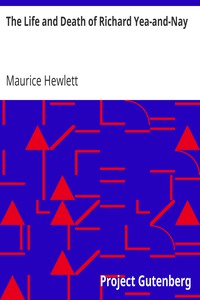The Life and Death of Richard Yea-and-Nay by Maurice Hewlett (digital ebook reader .txt) 📗

- Author: Maurice Hewlett
Book online «The Life and Death of Richard Yea-and-Nay by Maurice Hewlett (digital ebook reader .txt) 📗». Author Maurice Hewlett
'Richard, O Richard, touch me not!'
'God on the Cross, what is this?'
'Touch me not, touch me never; but never leave me!'
'O my pale rose! O fair-girdled!' She stood up, white as her gown, transfigured, very serious.
'I am not thy wife, Richard; I am no man's wife. No, but I am thy slave, bound to thee by a curse, held from thee by thy high calling. I dare not leave thee, my Richard, nor dare stay by thee so close, lest ruin come of it.'
Richard watched her, frowning. He was much moved, but thought of what she said.
'Ruin, Jehane, ruin?'
'Ruin of thy venture, my knight of God! Ah, chosen, elect, comrade of the Rood, gossip of Jesus Christ, duke dedicate!' She was hued like flame as the great thoughts leaped in her. 'Ah, my Christian King, it is so little a thing I ask of thee, to set me apart! What am I to thee, whose bride is the virgin city, the holy place? What is Jehane, a poor thing handed about, to vex heaven, or be a stumbling-block in the way of the Cross? Put me away, Richard, let me go; have done with me, sweet lord.' And then swiftly she ran and clasped his knees: 'But ask me not to leave thee—no, but I dare not indeed!' Her tears streamed freely now. When Richard with a cry snatched her up, she lay weeping like a lost child in his arms.
He laid her on the bed, worn frail by the strife she had endured; she had no strength to open her eyes, but moved her lips to thank him for his pains. At first she turned her head from side to side, seeking a cool place on the pillow; later she fell into a heavy, drugged sleep. He watched her till it was nearly light, brooding over her unconscious face. No thoughts of a king were his, I think; but once more he lapped them in that young girl's bosom, and let them sway, ebb and flow, with it.
On the flow, great with her theme, he saw her inspired, standing with her torch of flame to point his road. A splintry way leads to the Cross, where even kings consecrate must tear their feet. If he knew himself, as at such naked hours he must, he knew whither his heart was set. He was to lead the armies of Christendom, because no other man could do it. Had he any other pure and stern desire but that? None. If he could win back the Sepulchre, new plant the Holy Cross, set a Christian king on the throne below Golgotha, keep word with God Who had bowed to him from the Rood, give the heathen sword for sword, and hold the armed world like a spear in his hand, to shake as he shook—God of all power and might, was this not worthy his heart?
His heart and Jehane's! The flowing bosom ebbed, and drained him of all but pity. He saw her like a dead flower, wan, bruised, thrown away. Robbery! He had stolen her by force. He clenched his two hands about his knee and shook himself to and fro. Thief! Damned thief! Had he made her amends? He groaned. Not yet. Should she not be crowned? She prayed that she might not be. She meant that; all her soul came sobbing to her lips as she prayed him. He could not deny her that prayer. If she would not mount his throne, she should not—he was King. But that other bidding: Touch me not, she said. He looked at her sleeping; her bosom filled and lifted his hand. God have no mercy on him if he denied her that either. 'So take Thou, God, my heart's desire, if I give her not hers.' Then he stooped and kissed her forehead; she opened her eyes and smiled feebly, half awake.
He was not a man, I say it again, at the mercy of women's lure. Milo was right; he was Tristram, not Galahad nor Lancelot; a man of cold appetite, a man whose head was master, touched rarely, and then stirred only to certain deeps. So far as he could love woman born he loved Jehane, saw her exceedingly lovely, loved her proud remote spirit, her nobility, her sobriety. He saw her bodily perfections too, how splendid a person, how sumptuous in hue and light. Admiring, taking glory in these, yet he required the sting of another man's hand upon her to seize her for himself. For purposes of policy, for ends which seemed to him good, he could have lived with Jehane as a brother with a sister: one thing provided, Let no other man touch.
Now this policy was imperative, this end God said was good. Jehane implored with tears, Christ called from the Cross; so King Richard fell upon his knees and kissed the girl's forehead. When he left her that morning he sought out Milo and confessed his sins. Shriven he arose, to do what remained in the west before he could be crowned in Rouen, and crowned in Westminster.
CHAPTER XV LAST TENZON OF BERTRAN DE BORNI wish to be done with Bertran de Born, that lagging fox; but the dogs of my art must make a backward cast if they are to kill him in the open. I beg the reader, then, to remember that when Richard left him half-throttled in his own house, and when he had recovered wind enough to stir his gall, he made preparations for a long journey to the South. In that scandal concerning Alois of France he believed he had stuff which might wreck Count Richard more disastrously than Count Richard could wreck him. He hoped to raise the South, and thither he went, his own dung-fly, buzzing over the offal he had blown; and the first point he headed for was Pampluna across the Pyrenees. It is folly to dig into the mind of a man diseased by malice; better treat such like sour ground, burn with lime (or let God burn) and abide the event in faith. If of all men in the world Bertran hated Richard of Anjou, it was not because Richard had misused him, but because he had used him too lightly. Richard, offended with Bertran, gave him a flick on the ear and sent him to the devil with his japes. He did no more because he valued him no more. He thought him a perverse rascal, glorious poet, ill-conditioned vassal, untimely parasite of his father's realm. He knew he had caused endless mischief, but he could not hate such a cork on a waterspray. Now, it fretted Bertran to white heat that he should be despised by a great man. It seemed that at last he could do him considerable harm. He could embroil him with two kings, France and England, and induce a third to harass him from the South. So he crossed the mountains and went into Navarre.
Over those stony ridges and bare fields Don Sancho was king, the seventh of his name; and he kept his state in the city of Pampluna. Reputed the wisest prince of his day, it is certain that he had need to be so, such neighbours as he had. West of him was Santiago, south of him Castile. These two urgent kings, edging (as it were) on the same bench with him, made his seat a shifty comfort. No sooner had he warmed himself a place than he was hoist to a cold one. In front of him, over against the sun, he saw Philip of France pinched to the same degree between England and Burgundy, eager to stretch his extremities since he could not broaden his sides. Don Sancho had no call to love France; but he feared England greatly—the horrible old brindled Lion, and Richard, offspring of the Lion and the Pard, Richard the Leopard, who made more songs and fought more quarrels out than any Christian prince. Here were quodlibets for Don Sancho's logic. In appearance he was a pale vexed man, with anxious eyes and a thin beard, at which (in his troubles) he plucked as often as he could afford the hairs. Next to his bleached lands he loved minstrels and physicians. Averrhoes was often at his court; so were Guillem of Cabestaing and Peire Vidal. He knew and went so far as to love Bertran de Born. Perhaps he was not too good a Christian, certainly he was a very hungry one; and kings, with the rest of the world, are to be judged by their necessities, not their professions. So much will suffice, I hope, concerning Don Sancho the Wise.
In those days which saw Count Richard's back turned on Autafort, and Saint-Pol's broken at Tours, Bertran de Born came to Pampluna, asking to be received by the King of Navarre. Don Sancho was glad to see him.
'Now, Bertran,' says he, 'you shall give me news of poets and the food of poets. All the talk here is of bad debts.'
'Oy, sire,' says Bertran, 'what can I tell you? The land is in flames, the women have streaked faces, far and wide travels the torch of war.'
'I am sorry to hear it,' says King Sancho, 'and trust that you have not brought one of those torches with you.'
Bertran shook his head; interruptions worried him, for he lived maddeningly, like a man that has a drumming in his ear.
'Sire,' he said, 'there is a new strife between the Count of Poictou, "Yea-and-Nay," and the French King on this account: the Count repudiates Madame Alois.'
'Now, why does he do that, Bertran?' cried King Sancho, opening his eyes wide.
'Sire, it is because he pretends that his father, the old King, has done him dishonour. Says the Count, Madame Alois might be my stepmother, never my wife.'
'Deus!' said the King. 'Bertran, is this the truth?'
That was a question for which Bertran was fully prepared. He always had it put, and always gave the same answer. 'As I am a Christian, sire,' he said, 'the Gospel is no truer.'
To which King Sancho replied, 'I do most devoutly believe in the Holy Gospel, whatever any Arabian may say to the contrary. But is it for this, pray, that you propose to light candles of war in Navarre?'
'Ah,' said Bertran, with his hand scratching in his vest, 'I light no candles, my lord; but I counsel you to light them.'
'Phew!' said King Sancho, and stuck his arms out; 'on whose account, Bertran, on whose account?'
Bertran replied savagely, 'On account of Dame Alois slandered, of her brother France deceived in his hope, of the English King strangely accused, of his son John (a hopeful prince, Benjamin of a second Israel), and of Queen Eleanor of England, of whose kindred your Grace is.'
'Deus! Oy, Deus!' cried King Sancho, pale with amazement, 'and are all these thrones in arms, lighting candles against Count Richard?'
'It is so indeed, sire,' says Bertran; and King Sancho frowned, with this comment—'There seems little chivalry here, take it as you will.' Next he inquired, where was the Count of Poictou?
Bertran was ready. 'He rages his lands, sire, like a leopard caged. Now and again he raids the marches, harries France or Anjou, and withdraws.'
'And the King his father, Bertran, where is he? Far off, I hope.'
'He,' said Bertran, 'is in Normandy with a host, seeking the head of his son Richard on a





Comments (0)